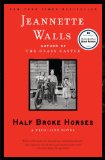Summary | Excerpt | Reading Guide | Reviews | Beyond the Book | Readalikes | Genres & Themes | Author Bio

A True-Life Novel
by Jeannette Walls
Dad also made tack for the horses, and he seemed happiest sitting by himself, humming at his sewing machine, working the foot pedal, surrounded by hides, shears, cans of neat's-foot oil, spools of stitching threads, and his big saddler's needles, no one bothering him, no one feeling sorry for him, no one scratching their heads trying to figure out what it was he wanted to say.
I was in charge of breaking the horses. It wasn't like breaking wild mustangs, because our horses had been around us since they were foals. Most times I simply climbed on bareback -- if the horse was too skinny, its spine sometimes rubbed a raw spot on my behind -- grabbed a handful of mane, gave them a nudge with my heels, and off we went, at first in awkward fits and starts, with a little crow hopping and swerving while the horse wondered what in tarnation a girl was doing on his back, but pretty soon the horse usually accepted his fate and we'd move along right nicely. After that, it was a matter of saddling him up and finding the best bit. Then you could set about training him.
Still, particularly with a green horse, you never knew what to expect, and I got thrown plenty, which terrified Mom, but Dad just waved her off and helped me up.
"Most important thing in life," he would say, "is learning how to fall."
Sometimes you fell in slow motion. The horse stumbled or shied, your weight got thrown forward, and you ended up hugging the horse's neck, your feet losing their lock in the stirrups. If you couldn't right yourself, your best bet was to let go and roll off to the side, then keep rolling once you hit the ground. The dangerous falls were the ones that happened so fast you didn't have time to react.
Dad once bought this big gray gelding for a song. The horse had been in the U.S. Cavalry, and since he was government-issue, Dad named him Roosevelt. Maybe it was because Roosevelt had been fed too much grain, maybe because he'd heard too many bugle calls and too many cannons fired, or maybe he was just born a worrier, but for whatever reason, he was one spooky horse. Roosevelt was beautiful to look at, with dappled hindquarters and dark legs, but sudden noises or movement made him jump up like a jackrabbit.
Shortly after we got Roosevelt, I was riding him back to the barn when a hawk swooped down in front of us. Roosevelt spun around and I was flung off him like a rock out of a slingshot. I tried to break the fall with my arm and ended up snapping my forearm clean in two. The jagged ends of the bones were poking up, making a bulge under my skin. Dad was always telling me I was one tough nut, but with my arm bent and dangling like that, danged if I didn't start bawling like a little girl.
Dad carried me into the kitchen, and when Mom saw me, she got so upset she started gasping for breath, telling Dad when she could get the words out that a little girl like me had no business breaking horses. Dad told Mom she had best leave until she could get control of herself, and she went into the bedroom, closing the door behind her. Dad set the bone and had Lupe cut strips of linen while he made up a paste of chalk, gum, eggs, and flour. Then he wrapped the linen strips around my arm and smeared them all over with the paste.
Dad took me in his arms and we set on the porch looking at the distant mountains. After a while, I stopped crying because there just wasn't any cry left in me by then. I sat there with my head on my shoulder like a little bird with a broken wing.
"Dumb horse," I finally said.
"Never blame the horse," Dad said. "It's just something he learned along the way. And horses aren't dumb. They know what they need to know. Matter of fact, I always figured horses are smarter than they let on. Kind of like the Indians who pretend they can't speak English because no good ever came from talking with the Anglos."
Dad told me I'd be back in the saddle in four weeks, and I was. "Next time," Dad said, "don't try to break a fall."
Excerpted from Half Broke Horses by Jeannette Walls. Copyright © 2009 by Jeannette Walls. Excerpted by permission of Simon & Schuster. All rights reserved. No part of this excerpt may be reproduced or reprinted without permission in writing from the publisher.
Your guide toexceptional books
BookBrowse seeks out and recommends the best in contemporary fiction and nonfiction—books that not only engage and entertain but also deepen our understanding of ourselves and the world around us.